Science Fiction First Editions
In 1995, or thereabouts, a friend of mine Peter Smart (of whom I can find no meaningful Web presence to link to sadly), leant me a book: Ring, by Stephen Baxter. I'd never heard of Stephen Baxter but if I recall correctly the conversation that lead to the loan was something like:
Me: I've just read Asimov's Foundation series.
Pete: Enjoy it?
Me: Very much, yes, but it kind of fits the stereotype for science fiction.
Pete: Yes - very 1950s. Tried any hard science fiction?
Me: Que?
Pete: Science fiction with an emphasis on science, much more literary and a world away from spaceships and aliens - although they do crop up from time to time too.
You get the idea. Ring was the first of Baxter's novels that I read. It's about a universe inhabited by the Xeelee, a race who have been going about arranging their survival beyond the heat death of the universe for millions of years.
Having enjoyed that I borrowed more from Pete and began buying my own. Online retailing was pretty much in its infancy then* but already had a feature that I have found essential since - pre-publication ordering. I ordered Stephen Baxter's then forthcoming novel Voyage.
And that was it. My collection of British science fiction first editions had begun.
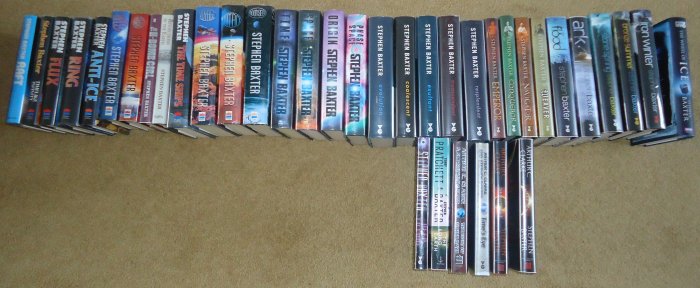
Voyage is one of my favourite of Baxter's books (possibly every other Stephen Baxter fan's favourite one of his too). It's a terrific what if story: what if NASA hadn't cancelled Apollo when they did and had gone ahead with the planned manned mission to Mars, pencilled into the calendar for the mid 80s?
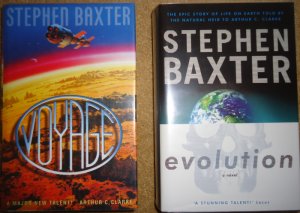
The book carries a lot of detail about NASA that you know has been thoroughly researched so the divergence between what happened in reality and what happens in the novel is kept to a minimum.
From Voyage onwards I've pre-ordered every Stephen Baxter novel (except his children's books) and have also looked out for first editions of his earlier novels. This week, due to the generosity of my wife and a certain event of trivial note the back catalogue was completed with a first edition of his first novel Raft.
First Editions

I read Raft years ago in that original batch of borrowed books so why the heck does it matter that it's a first edition? Ask any book collector, ask any collector of anything, and they'll tell you that the original is what matters most. It's because it was in that original speculative print run, before the author was successful. A first edition by an established author is not a collectable item. If you have a first edition of Harry Potter and the Deathly Hallows, well, big deal - so have countless thousands of other people. Got a first edition of Harry Potter and the Philosopher's Stone? You might want to insure it - it's worth around £10,000. But that's because the Harry Potter series is phenominally successful yet there were only 2,000 copies of that first book printed originally and half of them went off to Australia. Those books were bought on the off chance they might be good by people who had never heard of J K Rowling as she sat writing in the warmth of her local Starbucks. That makes them special. That's why my copy of Raft, which is in fine condition, sells for hundreds of pounds (although this one was a bargain at 'only' £90).
Kim Stanley Robinson
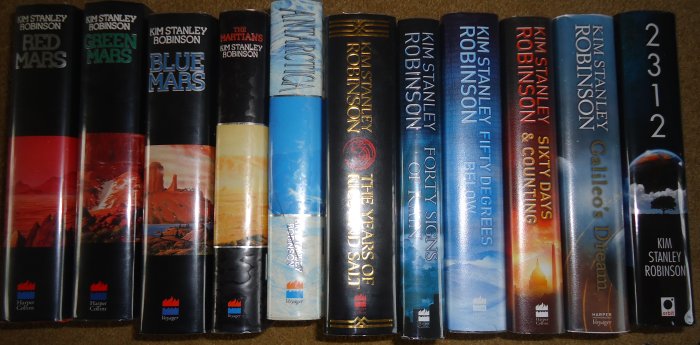
It's not always the first novel by an author that is most collectable. Having introduced me to Stephen Baxter, Pete Smart also introduced me to Kim Stanley Robinson, in particular, his Mars Trilogy. His earlier novels - the Gold Coast etc. are well respected but they're not the ones that made him famous - it's Red, Green and Blue Mars that did that.

They tell the story of our colonisation of Mars beginning with John Boone's first footprint on the red planet and the words "well, here we are on Mars" and going through to a politically and environmentally stable planet many years later. Stephen Baxter's novels often cross enormous time spans from the Big Bang through to the eventual triumph of entropy, whereas Kim Stanley Robinson focuses on political evolution. His Mars trilogy is utterly credible. Space elevators (first postulated in Arthur C Clarke's Fountains of Paradise) are in full swing on both Earth and Mars, and Martian society develops in a way that just feels as if it's true. The detail of the landscape is rich and you get a real sense of place - I referred to the map at the front of the book continually and got to know the names of many features of Mars - all of which you can of course check on NASA's maps. You forget you're reading fiction. The 'gerontological treatments' allow his characters to live for many hundreds of years - and again, I find that utterly credible to the point where I am confident my (real) children could well live for many centuries.
The copy of Red Mars that I read was a mass market paperback, but I kept an eye out for a first edition.
Amazon Marketplace has the advantage over eBay in that there's just a chance you'll find someone selling a book worth
hundreds of pounds that they think is not worth much at all and that no one is going to tell them. In an auction or a
professional bookseller's that never happens. I saw a hardback copy of Red Mars for sale - no extra details,
no claims of it being a first edition or anything. But at £12 including postage I thought it was worth a chance. I took it
and within a couple of days, the parcel arrived. I carefully unwrapped it. The book was unread, in fine condition and so I
gingerly turned to the frontispiece - there were the print run numbers: 1 3 5 7 9 10 8 6 4 2 plus all the
other clues. I had paid £12 for a book I'd regularly seen advertised for £600 (although it's come down a lot since then).
Peter F Hamilton

Pete Smart isn't the only person to have introduced me to new science fiction. My cousin's son (second cousin??) Matt Archer told me about a trilogy he'd heard of that was supposedly, whisper it, better than Dune. I can pinpoint the day I heard this - it was July 29th 2000, the day of my parents' Golden Wedding. I've not read any of Frank Herbert's books — I've only seen the, well, disappointing film of Dune — so the fact that Peter F Hamilton's Night's Dawn trilogy was better wasn't hard to believe.

I saw a paperback copy of the first book, The Reality Dysfunction shortly afterwards and took it on holiday — and did little else other than sit and read it until I'd finished it … and then went into the nearest bookshop to search out The Neutronium Alchemist (the second in the trilogy).
I had to wait for the third and final part to come out so I used that time to read Peter F Hamilton's earlier books (the Greg Mandel series). As with Kim Stanley Robinson, it's not the early Greg Mandel books that go for the big money — they were only ever published in paperback** — it's those Night's Dawn first editions that go for the big bucks.
I well remember the day my wife came home from work and I owned up that I'd just paid £250 for a book I'd already read.
Peter F Hamilton's books are, in the main, huge — typically around 900-1,000 pages — but I've always whipped through them in next to no time because they are rip-roaring reads. Night's Dawn has enormous living habitats in space, a force for evil, mass colonisation, a few aliens and lots of beam weapons. Subsequent novels are in different universes but there a couple of recurring themes. For example, humans all have what we might think of as internet access directly from our brains. That's a long established idea in SF but with Hamilton's novels, plus modern state of the art, it feels very plausible indeed.
Space ships, goodies & baddies, multiple interweaving plots with plenty of richness of character, double dealing — and one or two sexy women for good measure — Peter F Hamilton writes fun stuff.
Alastair Reynolds
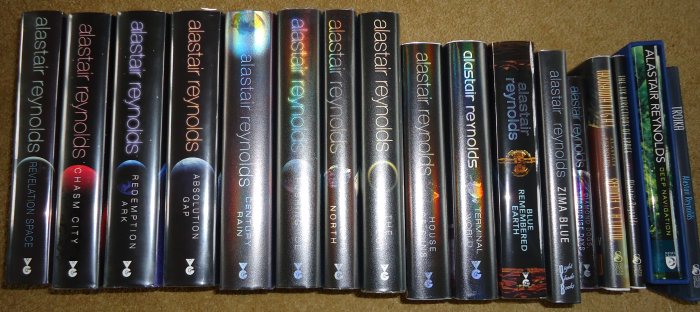
Alastair Reynolds is now a highly successful SF writer. He famously won a £1m contract with Gollancz in 2009 and it's not surprising. His books are superbly written (House of Suns is my favourite) and manage to remain credible, avoid cliché, and yet deliver first class space opera - yes, with space ships, aliens and beam weapons - although the first book under his new contract, Blue Remembered Earth just has the space ships, no aliens, no beam weapons.

I think it was an Amazon recommendation that first put me on to Alastair Reynolds. Like so many of the books on my shelf, I really want to re-read a lot of his books because I know I've missed a lot of the detail. I want to go back and make sure I know my Ultras from my Lighthuggers and my Shrouders from my Inhibitors. The problem is, there are always new books I want to read too.
The collector's item is the first edition of his first novel, Revelation Space. Although this is a UK first edition, and therefore 'in scope' as far as I'm concerned, I actually bought it from an American dealer. I got it not long before Alastair Reynolds became really successful. I can't recall what I paid for it but it wasn't expensive. I've just seen a (sigend) copy for sale at Cold Tonnage books for £200.
As a complete aside, from Revelation Space to The Prefect, the first editions are larger than most hardbacks which means I have a bookshelf fixed at a height specifically for those books (and a couple of big dictionaries).
Alastair Reynolds tweets under the name @AquilaRift.
Adam Roberts
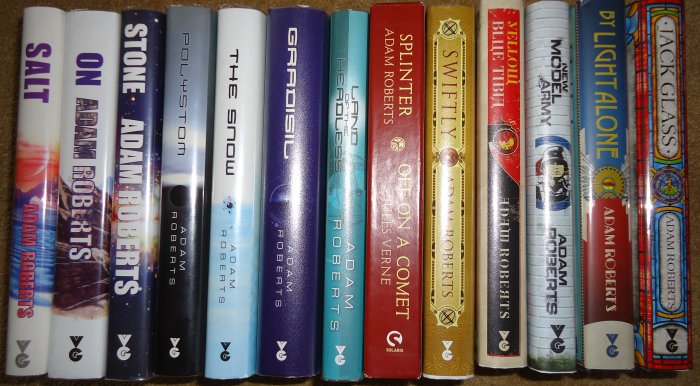
Adam Roberts is the Hilary Mantel of science fiction. He's that good. Unlike another exceptional science fiction writer, Margaret Atwood, Adam Roberts doesn't mind being called a science fiction writer which is why you don't see him shortlisted for the Man Booker prize or similar. It's not because his writing isn't of that quality. I've read many prize winning novels — including Hilary Mantel, Margaret Atwood, Khaled Hosseini, Yann Martel and more — and Adam Roberts is definitely of the same calibre. The fact that he's a professor of 19th century literature gives you a further clue that this man knows how to put a novel together.
I bought his first novel, Salt, as a trade paperback following some online blurb that said "here's the first novel from a major new talent in science fiction." From then on, like Al Reynolds, it's been pre-orders all the way and a quick dive back to the second hand market to get the proper first edition of that first novel.

To date, he hasn't found the kind of recognition I believe he deserves. Yellow Blue Tibia got excellent reviews as did New Model Army. Simon Mayo interviewed him for Radio 5 Live when By Light Alone came out; but Jack Glass? Jack Glass took my breath away. A bunch of convicts sentenced to 11 years' mining duty on an asteroid. All they have is an air scrubber, a food source, digging equipment and the pleasure of each other's company. How could anyone possibly escape from that. Oh, and that weird flash on the monitor near the beginning of part 3, what's that about? No spoilers - read the novel.
Away from his professorship and writing, Adam Roberts issues a stream of puns in 140 characters or less on his twitter feed. Some are very contrived, some are very clever. My favourite:
It turns out that prepositions have temperatures. How cool is that?
Obsession?
These are the authors whose mainstream novels I continue to collect. A real fan would go after the issues of Interzone they've been in and all the small press publications (I have some of these but there are gaps). I've not mentioned others — Iain M Banks, Ken Macleod, Gary Gibson and more — but it is perhaps true that the 'must have the set' attitude smacks of obsession? Maybe, but these books are important to me and without exception are of the same standard as the kind of thing that gets discussed on Radio 4. OK, there are one or two duffers but that's true of the ones that get talked about in mainstream media too.
As for the value of these things — as my wife says, they're only worth something if you're going to sell them which you're not so really they're just taking up space and gathering dust. Hmmm … she has a point but if you'll excuse me, most of the authors mentioned here have books available for pre-order at Waterstone's and I need to get busy.
* I used to use Amazon but now almost exclusively use Waterstone's — I try not to support tax dodgers and value the presence of real bookshops in the high street.
** Even so, I'd really like first editions of the three Greg Mandel novels - if only I knew for sure what to look for.